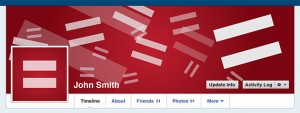Same-sex marriage not inequality’s end
April 9, 2013
Kara Hemphill
If you have a Facebook account, you probably noticed a lot of red equal signs popping up on your news feed over spring break.
This is primarily because on March 26, the U.S. Supreme Court heard oral arguments for the case Hollingsworth v. Perry – better known as the case connected to California’s Proposition 8, an amendment to the state constitution that allows only opposite-sex couples to marry.
Also gaining a lot of press was United States v. Windsor, the case involving the Defense of Marriage Act, or DOMA, for which the oral arguments were heard in court on March 27.
Both Proposition 8 and parts of DOMA have been ruled unconstitutional in U.S. courts before now.
Naturally, the renewed debate on the topic of same-sex marriage sparked animosity on both sides. But it also resulted in something else: Those aforementioned red equal signs.
Supporters of marriage equality quickly switched over their profile pictures to a pink equal sign on a red background, and before long it seemed that every other profile picture was red.
According to a Facebook data scientist, about 2.7 million more people changed their profile picture on March 26 than on the previous Tuesday, a jump that is credited to the now-infamous red symbol, which originated with the Human Rights Campaign (HRC), a pro-LGBT rights group.
But while the equal signs were a remarkable show of solidarity for a historically marginalized group of people, their prominence shouldn’t be taken for a sign that the fight is coming to an end.
It is all too easy to get caught up in this kind of passive Internet activism (called “slacktivism” by some) with no real feeling for the issue at hand. After all, when was the last time we heard something about Kony since the “Kony 2012” online campaign?
The appearance of the equal signs was reassuring because it illustrated a shift in opinion. Where even voicing support for gay rights was once viewed as taboo, and even a reason to speculate that someone was gay themselves, it is now much more commonplace.
However, it is also something to approach with a tinge of skepticism. It is dangerous to assume that a large number of young people on Facebook voicing their support for marriage equality is the same thing as a large-scale shift of opinion: especially among those in power.
Changing a profile picture is easy: especially in a day and age where showing support for gay rights is much less likely to get you into trouble. It’s a show of support that can do a lot to lift the spirits of LGBT people, especially youth who sometimes need it most.
But because it is so easy to upload a premade picture to your Facebook account, it can also be easy to forget about – and that is a dangerous mistake to make.
Marriage equality is only the beginning, and I do agree that it is a significant step towards equality, just like the repeal of Don’t Ask, Don’t Tell in 2011. But giving rights to a privileged few is not the same as true equality, and it should not be labeled as such. It is equality of marriage rights, and perhaps a catalyst for conversation, but nothing more.
Same-sex marriage will benefit a large number of same-sex couples, but it isn’t a blanket solution to all of the problems members of the
LGBT community face in the U.S. LGBT youth continue to face higher rates of homelessness and suicide than straight youth do; and marriage doesn’t even touch the number of unique problems transgender Americans face.
I think it is fantastic that so many people came out in support of marriage equality in the past few weeks, and I don’t want to undermine that. Speaking up about equality is necessary, even if it’s on the Internet.
The surge of red symbols on Facebook was a great way to illustrate the changing views of an important portion of the population, and hopefully to change some more minds along the way. But in the end they were just that – symbols, which would soon be taken down to be replaced with pictures of drunken spring breakers, people kissing their dogs, and the occasional random Pokemon.
Internet solidarity is good; real life solidarity is better. I would hate to see support for gay rights become a passing Facebook fad, because it is an important and ongoing issue.
As college students, we have the power to create change now and in the future, and I hope that our generation can keep sight of what’s important rather than relying on passing trends to do our thinking for us.











